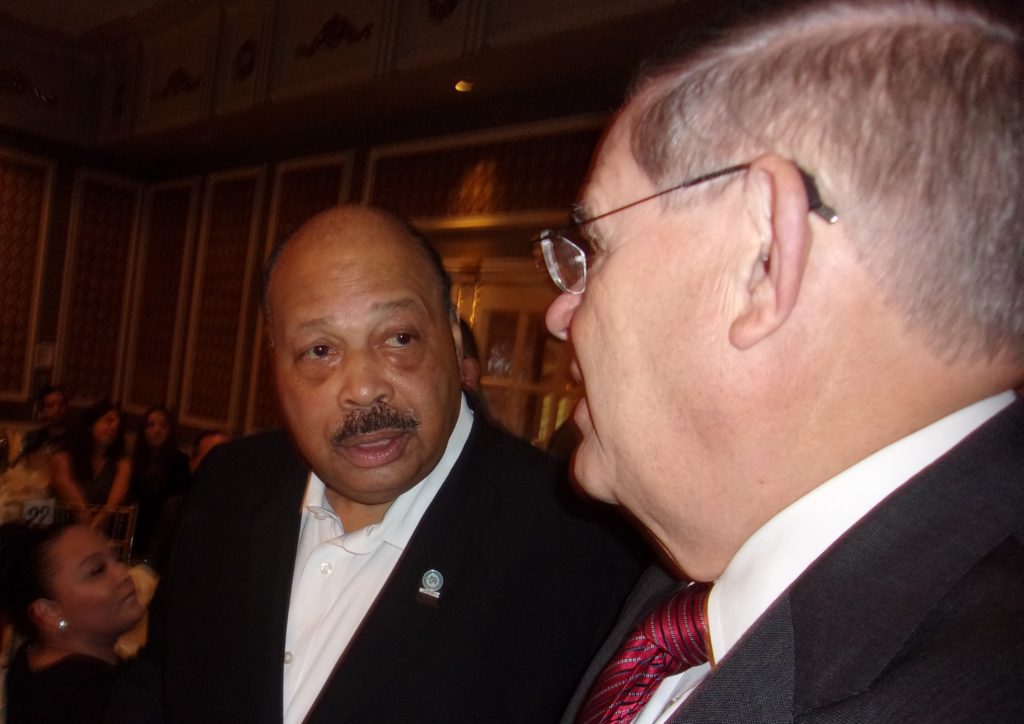Reversing the Slump of Political Parties Will Bring More Accountability and Transparency
Listen to audio version of this article

Political parties in New Jersey are in a serious state of decline.
This becomes apparent when comparing their financial activity between two similar election cycles, 1997-2001 and 2013-2017. In each cycle, two gubernatorial elections as well as legislative elections were held.
During 2013-2017, the Big Six state party entities raised only 49 percent of what they raised between 1997-2001. Similarly, between 2013-2017 the two state party committees and four legislative leadership committees spent just 48 percent of what they spent during the earlier period 1997-2001.
County parties have fared slightly better. From 2013-2017, the county organizations raised and spent only 63 percent of the money raised and spent between 1997-2001.
Both groups combined were 56 percent and 55 percent, respectively, of earlier totals.
Campaign Finance Activity by Big Six and County Parties-
2013-2017 Versus 1997-2001
| Big Six* | ||
| Period | Raised | Spent |
| 2013-2017 | $43,547,228 | $44,628,393 |
| 1997-2001 | $88,981,213 | $92,917,025 |
| 2013-2017 Versus 1997-2001 | 49% | 48% |
| County Parties | ||
| 2013-2017 | $50,922,635 | $49,980,239 |
| 1997-2001 | $80,569,637 | $79,841,813 |
| 2013-2017 Versus 1997-2001 | 63% | 63% |
| Big Six Plus County Parties | ||
| 2013-2017 | $94,469,863 | $94,608,632 |
| 1997-2001 | $169,550,850 | $172,758,838 |
| 2013-2017 Versus 1997-2001 | 56% | 55% |
*Two state parties and four legislative leadership committees.
The harm to democracy and to open, transparent government, cannot be overstated when considering the overall downward trend in party financial activity over the last decade and more.
Many may welcome this trend. Throughout American history there has been a skepticism toward political parties. But in truth the demise of the political party system represents the abdication of an important quasi-governmental institution that has proven to be a significant part of our civil society.
As Marjorie Randon Hershey states in Party Politics in America . . . “virtually everything important in American politics is rooted in party politics. Political parties are the core of American democracy. . .”
In today’s frenetic atmosphere, driven by a rapidly expanding social media complex that thrives on and feeds into the polarization of American politics, Ms. Hershey’s comments perhaps point the way toward a more traditional, though robust politics.
To accomplish this, the strength of the party system must be restored.
At critical times in American history, a steady hand has often been needed to quiet the political waters. Perhaps during these times, political parties may serve this purpose.
Political parties have always provided a map for officeholders to follow while serving the people. By doing so, political parties have helped to moderate politics and control extremism. They help to bring about compromise, thereby building majorities to enact legislation.
By exerting discipline and spotlighting priority issues, political parties give focus to officeholders and guide voters when filling out their ballots.
While having an informed citizenry is a cherished goal, it has been jeopardized as society has become more complicated. The dizzying array of information voters encounter on social media is especially challenging.
Political parties, with their symbols and labels, simplify matters for voters. Since parties stand for certain issues, voters usually know what governmental policies will be pursued by candidates who win.
One of the concerns expressed by political activists is the need to increase voter participation in elections. In other words, low voter turnout has become a persistent worry.
Political parties can serve as an antidote to low voter turnout. One of the traditional roles of political parties has been to turn out the vote.
And they are good at that.
In the 1950’s, when the public strongly identified with one of the two major parties, voter turnout was high, somewhere between 65-75 percent of eligible voters, depending upon the election.
Recent years have witnessed a decrease in party identification, with close to 40 percent identifying as independents. At the same time, voter turnout has declined to a low 39 percent in the 2017 gubernatorial elections.
A strong party system, with a traditional focus on getting-out-the-vote can help to remedy that problem.
While there are many reasons for restoring the political party system, none is more compelling than bringing greater accountability and transparency to the electoral process.
Parties are regulated by law. New Jersey’s statutory law provides for how parties are to be organized. This open process even allows for primary voters to select county committee people, or those who have an official role in party organization.
Campaign finance law imposes contribution limits on donations to parties and requires ongoing reporting by parties in terms of their fundraising totals and in terms of how much money they spend and for what purpose.
This transparency is in the best interest of the public.
Having traced trends in campaign finance for many years, the Election Law Enforcement Commission (ELEC) has set forth a number of proposals that would strengthen the party system, and thereby democracy in New Jersey.
It has called for increasing contribution limits, allowing state parties to participate in gubernatorial elections, allowing county parties to contribute to each other, excluding parties from the pay-to-play law while including special interest PACs within it, and requiring contractors to disclose contributions to independent groups.
Further, a personal recommendation would be to provide a tax credit for contributions to political parties.
Hopefully the Legislature will take note of the trends and move on legislation that would strengthen parties and bring greater transparency to the process.
Jeff Brindle is the Executive Director of the New Jersey Election Law Enforcement Commission.
The opinions presented here are his own and not necessarily those of the Commission.









Leave a Reply